Ben Dubin-Thaler ’00 is bringing the fun of science to underserved communities.
Columbia College | Columbia University in the City of New York
Ben Dubin-Thaler ’00 is bringing the fun of science to underserved communities.
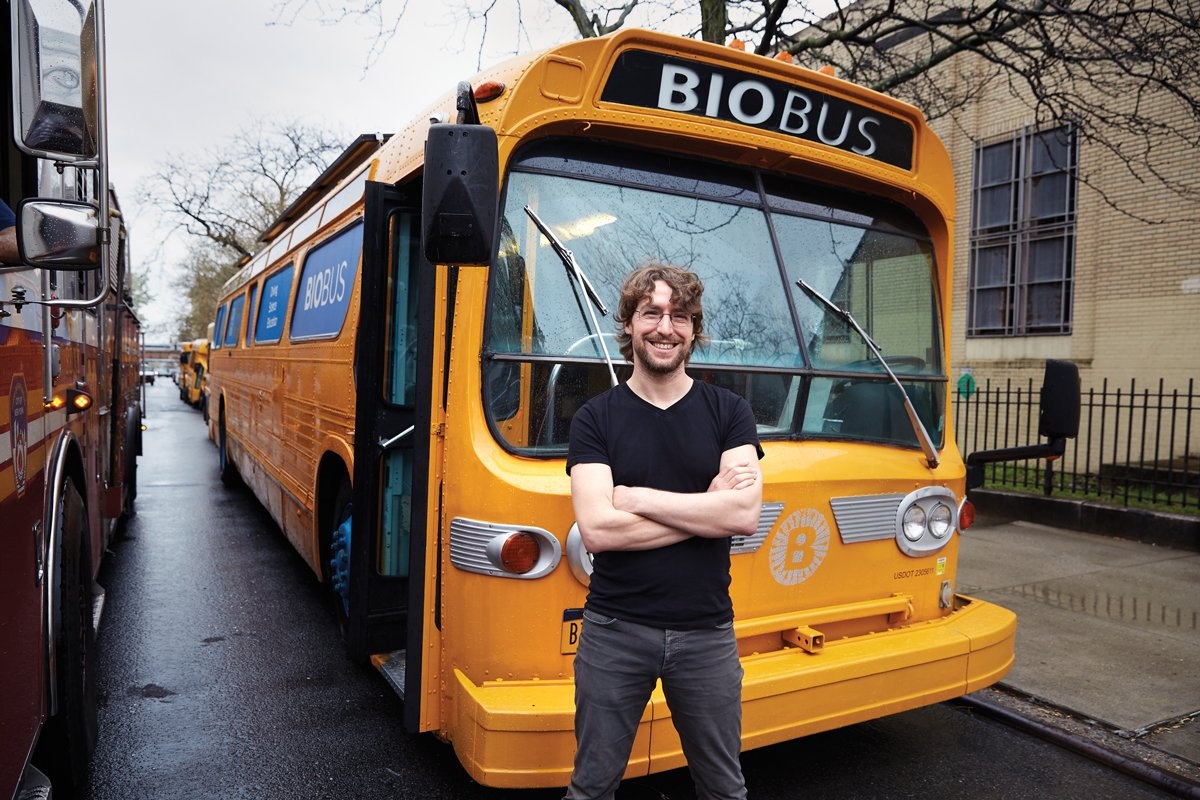
William Wu
Outside P.S. 133 in Harlem one rainy Monday morning, a squealy group of first-graders are jumping off a bus. It’s not a school bus, or even a city bus — the excited students have just finished a 45-minute, hands-on science class aboard a solar-powered mobile laboratory called BioBus. Examining tiny crustaceans under powerful research microscopes is heady stuff, and several children linger. At the door, Ben Dubin-Thaler ’00, GSAS’08 Ph.D. looks on, pleased.
“Dr. Ben,” as he is known to students, started BioBus in 2008 to test a hypothesis. While getting his Ph.D. in biology, he would invite friends and their kids to the lab where he did research, and the youngsters always loved it. Dubin-Thaler became convinced that, provided the tools and opportunity to do hands-on experiments, any young person could get excited about science. “All the research shows that lab experience is a huge predictor for people following STEM careers,” he says. An activist as well as a scientist, Dubin-Thaler was determined to bring science education and engagement to underserved minority, female and low-income K–12 students in New York City.
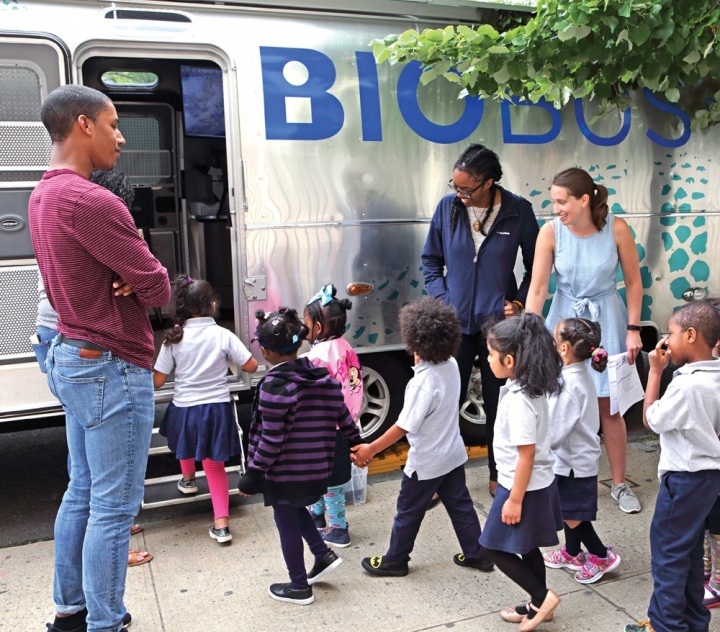
Students from a Bronx elementary school boarding the BioBus II Airstream.
Andy Cribb / Cribb Visuals
Dubin-Thaler’s hypothesis was correct, and he’s proven it several times over.
Science runs in Dubin-Thaler’s family. His father, stepmother and stepfather are all physicists (his mother, a rebel, is a lawyer), and Dubin-Thaler recalls being immersed in the subject while growing up in suburban Philadelphia. “I was definitely in and around labs when I was as young as these kids, and it was very formative for me,” he says. His father taught physics at the University of Illinois, and an early seed for BioBus was planted when Dubin-Thaler, still in high school, interned one summer with physicist Mats Selen, a colleague of his father’s. Selen had started an outreach program called the Physics Van, featuring whizbang experiments for kids (rockets! liquid nitrogen!). Selen also got Dubin-Thaler thinking about what he wanted to get out of college.
Three generations of Thaler men attended Columbia, so it would seem that he was destined to become “Dr. Ben” before he even walked through the Gates. But Dubin-Thaler was open to having a College experience that would shape and potentially alter his path. “The really formative piece for me was the activism, both the legacy of activism and the activism that was happening on campus at the time,” he says. “There were protests to diversify the Core Curriculum, and pushes for union rights for campus workers and tenants’ rights in the Columbia community. That’s what really changed me — the broader social thinking from the Core and the hands-on activism that I got to be a part of.”
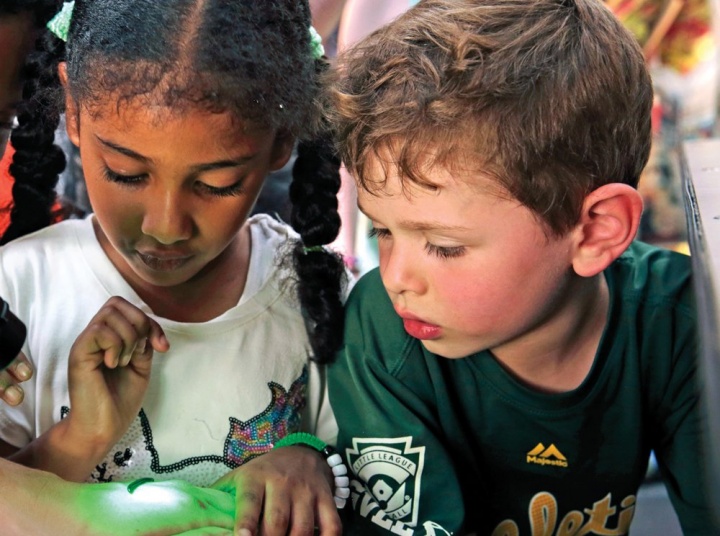
Observing a caterpillar aboard BioBus II at the World Science Festival.
Andy Cribb / Cribb Visuals
A collection of science mentors helped Dubin-Thaler find his way. As a senior, he interned with Nobel laureate Horst Stormer (one of the founders of Frontiers of Science), who helped him realize he had talent as a scientist and could be successful in the lab. Dubin-Thaler’s transition from physics to biology also occurred at that time. Emeritus Professor Michael Sheetz, an interdisciplinary biologist and biomedical engineer, was being recruited by Stormer for the biological sciences department. He and Dubin-Thaler connected during a visit to Stormer’s lab, and Dubin-Thaler worked for Sheetz as a research assistant for three years after graduation. He earned his Ph.D. with Sheetz as his advisor.
“So many kids in the city didn’t have anything close to the opportunities and exposure to role models that I had.”
Knowing that Dubin-Thaler was struggling with how to make a difference in the world, it was Sheetz who put Dubin-Thaler on an actual bus — albeit one with a slightly different purpose. Dubin-Thaler was sent on the road with Reverend Billy and the Stop Shopping Choir, a social activist theater troupe helping local communities engage with important issues such as First Amendment defense and Earth justice. “That tour was so audacious and inspiring! It gave me the opportunity to explore the social engagement side of science that I was still figuring out,” he says. “One of Billy’s teachings that I still carry with me is the idea of ‘exalted embarrassment’ — that often the right thing to do is also very embarrassing to do. Making a meaningful connection with students often means doing silly things, like pretending that I’m a shrimp.” On tour with Reverend Billy in a 1970s transit bus, Dubin-Thaler finally put all the pieces together — he could create a bigger version of the Physics Van, a moving science lab that could get young people inspired about science and create some social change.

Dubin-Thaler readies micro-content before a class.
William Wu
“It was eight high school students from a GED program in Harlem,” he recalls. “They were excited for the new experience and very patient with me as I showed them cells from goldfish scales slooooowly crawling across the screen. Then they saw an animal attached to one of the scales and that’s what we spent the next two hours looking at — they were obsessed. They named it ‘Two Lips.’”
He had zero business experience, but classmate and start-up expert Jeremiah Marble ’00 was on hand for advice. “I didn’t know what I was doing, but in retrospect my instincts were good enough,” Dubin-Thaler says. “And the need was obvious.”
From a philanthropic point of view, the 2008 economic crisis wasn’t the best time to start a nonprofit, but BioBus got a lift from partners like Olympus, which donated lab equipment, and Columbia, which helped sign up volunteers and generate publicity at events with the bus parked on College Walk. Early, critical support also came from biotech company Regeneron, co-founded by Dr. George Yancopoulos ’80, GSAS’86, PS’87. Dubin-Thaler connected with science teachers in the community through programming at CUMC, and began making school visits in the South Bronx with the assistance of the Department of Education program Gear Up. BioBus was on the road, and picking up speed.
What’s more, Dr. Ben had found his calling in mobile teaching. “You have this chance to open a young person’s eyes to an incredible experience they’ve never even imagined,” he says. “I especially love rainy days on the bus, because students can collect puddle water before coming aboard. In there are paramecium, flagellates, small animals and micro-crustaceans — it’s a zoo right on the sidewalk. And that’s the best, when someone leaves the bus thinking about their world in a very different way.”
After a fruitful seven years, BioBus’s mission was ready to expand. “The students wanted more, the teachers wanted more and the parents wanted more, but logistically it was difficult to do longer classes on the bus,” Dubin-Thaler says. Enter the BioBases, where elementary-, middle- and high-school students can take classes in biological, environmental and material science after school, on weekends and during the summer. The first BioBase education center was created on the Lower East Side with the help of the LES Girls Club.
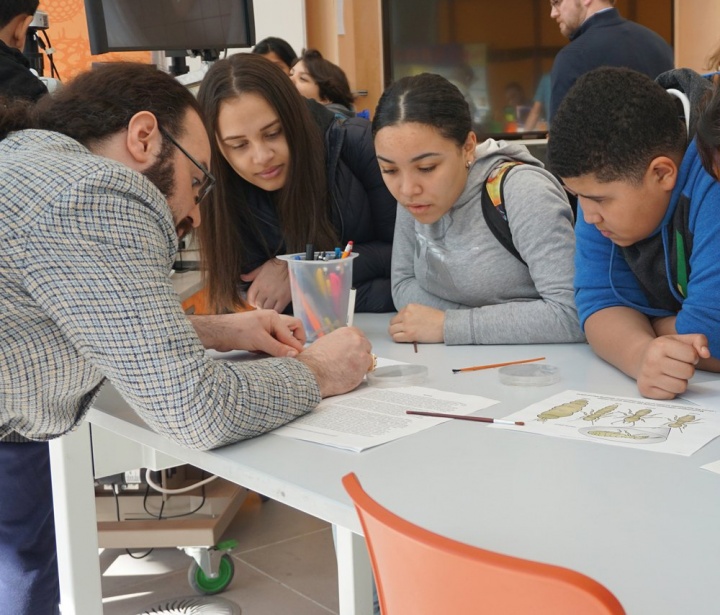
A science class at BioBase Harlem, in the Zuckerman Institute’s Education Lab.
Paula Croxson for Columbia University’s Zuckerman Institute
Senior Director of Scientific Programs Kelley Remole ’04, GSAS’12 Ph.D. worked with Dubin-Thaler on the BioBase Harlem launch. “It was a very fortuitous time to bring on a partner in science education with different expertise,” Remole says. “Our respect for Ben and what he’s done is profound — his ability to deliver science in an authentic way and engage people who wouldn’t otherwise have the opportunity to be engaged makes this a valuable partnership to us.” The Education Lab opened in February 2017; the ground floor-level space is flooded with natural light and has rolling desks and lab equipment that can be flexibly configured for group study. In addition to the Lab’s regular community programming, BioBase Harlem runs afternoon and after-school classes there three days a week and teaches advanced lab sessions on weekends.
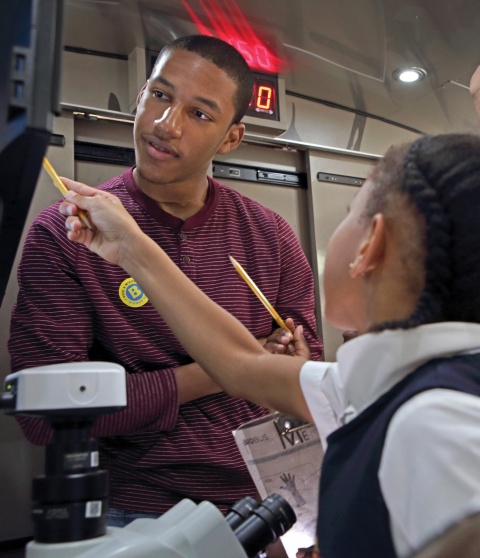
BioBus intern Eduardo Garcia helps a student from Girls Prep elementary school.
Andy Cribb / Cribb Visuals
BioBus now has 30 employees, including a facilities team that manages the buses and equipment and the operations team that handles the logistics of having 50,000 students a year onboard. “I’m most proud of the pathways we’ve been able to build,” Dubin-Thaler says. “I hear from former students a lot — there are dozens who have gone to college to study science, and they tell us it’s partly because of their experience with us.”
Dubin-Thaler believes that every student in New York City should have the opportunity to follow a science path. His number 1 goal is volume: more buses crisscrossing the city and a bigger network of community labs. “If BioBus can come together with city officials, scientific and education communities, and universities and hospitals, and make that a priority, I think we would see an amazing shift in all areas of the city,” he says. “I think we would increase the amount of trust between communities and science, and we could increase opportunity and start to address economic disparity. And we would also have more scientists, better science and more diverse representation in the science community.”
Also, he says, science is just super fun. “I’m happy to help young people be more fulfilled and better able to follow their interests, whatever they are,” he says. “Every class we have on the bus, there are three or four kids who you can see are ready to get on that path. They’re the ones who want to skip recess to stay on the bus.”

Published three times a year by Columbia College for alumni, students, faculty, parents and friends.
Columbia Alumni Center
622 W. 113th St., MC 4530, 6th Fl.
New York, NY 10025
212-851-7852
cct@columbia.edu

Columbia Alumni Center
622 W. 113th St., MC 4530, 4th Fl.
New York, NY 10025
212-851-7488
ccalumni@columbia.edu